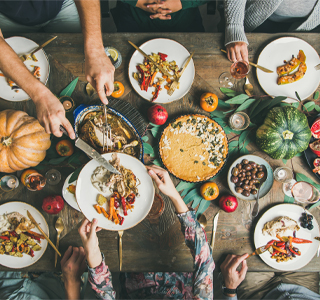How to Recover From a Food Hangover
Thanksgiving is a time of family, friends, football, and, typically, overeating. We have all been there, when “one last bite” turns into finishing your whole plate and going up for seconds, or when one slice of pie turns into three. Overeating is a feeling most of us know. On top of the pants-unbuttoning, too-full feeling, many may also experience guilt and shame. Not to mention research shows overeating may alter the brain as much as hard drugs.
However, there is a silver lining, a lot of people overeat and there are a lot of ways to handle it in a healthy way, both immediately after it happens and in the days to come. This Thanksgiving, do not spend the following week in your sweatpants (because that is all that fits right now), but actively recovering from your Thanksgiving gorge with these three tips.
But first, why do we overeat?
Overeating has become commonplace because we are presented with opportunities to overeat every single day. Every day we are bombarded with imagery of eye-catching comfort food, and that delicious, low-cost food is almost always just a car ride, phone call, or food delivery app away. Not to mention the portion sizes are much larger in the United States than just about every other country. If you do not feel you overeat your stomach’s capacity, you may be overeating your calorie needs.
Tip 1: Get moving
Getting off the couch after finishing yet another slice of your grandma’s homemade pie may seem like an impossible feat, but you will thank yourself later.
Overeating slows digestion, making you feel stuffed, sluggish, and exhausted. Additionally, sugary and salty foods pull fluid from your cells, throwing off their levels. Even just taking a walk after eating helps restore your cells’ fluids and kicks up your metabolism.
Tip 2: Hydrate, but not too much
Water will help flush out some of the sodium you have consumed, but do not overdo it because it could result in you feeling more full and more uncomfortable. Four to eight ounces after a large meal should help without making you feel too full. Also, skip the digestif. Those who drank wine and cherry schnapps after a heavy meal digested their food more slowly than those who drank water, according to a study in the British Medical Journal.
Tip 3: Eat more, not less…but make it healthy
Your instinct for your next meal might be to munch solely on lettuce, but eat a normal, healthy meal instead. Eat when you are hungry and stop when you are full. Recognizing your body’s hunger signals can be difficult at first, but the more you pay attention to and respond to what your body is telling you, the easier it will become. You do not have to force yourself to eat your next meal if you are not hungry yet, but if you are, do not feel like you need to skip that meal. Just make sure it is both healthy and satisfying. Try a meal high in insoluble fiber and low in fat, like vegetables and legumes. Insoluble fiber increases digestion, helping you recover in no time.
